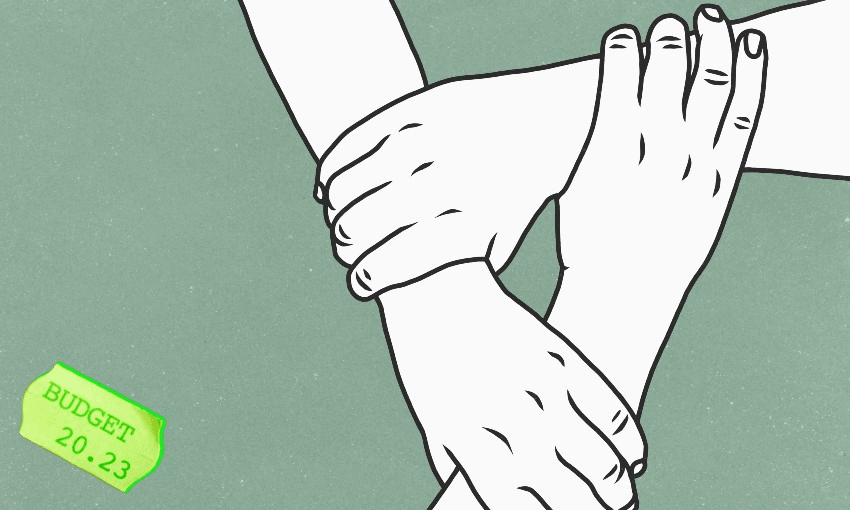They play an essential role in our communities, but for too long social services kaimahi have been an underpaid, under-recognised and undervalued workforce.
There’s a hidden workforce in Aotearoa New Zealand that is contributing immeasurably to helping our communities and hapori get through these challenging years. Years that continue to be marked by the pandemic, social cohesion and then friction, climate crisis-induced disasters, and dramatically inflated costs of everyday life.
In fact, without this workforce – made up of those working across our community-based social services – our country would likely be far worse off.
This is a workforce made up of a diverse range of people from all sorts of cultures and experiences, and an array of disciplines and professions. These kaimahi are equipped with the expertise, mātauranga and skills to walk alongside people in the toughest of situations, and to prevent challenges unravelling into crisis.
I call these kaimahi Aotearoa New Zealand’s hidden heroes, and on budget day this Thursday, I’m looking to see them made more visible, through investing in their wellbeing, alongside greater investment in children, rangatahi and whānau.
Why “hidden heroes”, you might first ask?
They’re often hidden because this is a workforce made up of people overwhelmingly humble in nature, resolutely focused on the task at hand – serving others by providing help, preventing harm, and strengthening familiy and whānau outcomes.
They’re heroes for many reasons. But what stands out most to me is the way they continue showing up for the children, rangatahi and whānau relying on them for support.
I can guarantee someone in your life will, right now, be relying on the support of social services kaimahi, or will have done so at some point in the past few years.
Perhaps it was a child needing extra support due to lockdown anxiety. Perhaps it was because of an impossible choice between kai or paying the skyrocketing rent. Perhaps due to family violence, child abuse or neglect. The insidiousness of meth addiction. Because of losing so much through the floods or cyclone. For some, it’s probably a combination of these.
The point being that the context that our community-based social services kaimahi provide help within is often complex, unpredictable and volatile. It’s mahi that can take its toll. More often than not, trauma – often intergenerational trauma or mamae – is present for those seeking social services support, requiring acknowledgement and healing.
Social services kaimahi navigate this and more, building trust, walking alongside people in all their complexities, helping them to have a sense of hope, recognising that we all have strengths, even if they too have been hidden for some time. Through all this, these kaimahi continue showing up.
Something worth remembering, too, is that with modern life seemingly having reached peak unpredictability, any one of us might unexpectedly need to call on the support of community-based social services.
These services and kaimahi remain an essential part of our connective tissue as communities, hapori and as a society as a whole. Yet for too long, they have been a workforce underpaid, under-recognised and undervalued.
Undoubtedly, some positive steps have already been taken, such as the 2022 community-based social work pay equity settlement, and the government’s commitment to extending this to all community-based social work roles. But more investment is needed to strengthen our social services.
Investing in social services kaimahi hauora (worker wellbeing) is the place to start. Like many kaimahi across our Social Service Providers Te Pai Ora o Aotearoa (SSPA) member organisations, I’m hoping to see this reflected in Budget 2023.
What does this look like? It’s government investing in the wellbeing of these hidden heroes, so that our social services workforce is enabled to do the demanding mahi it handles every day, and to sustain its efforts over the years ahead.
Kaimahi across the sector have told us this is an area needing investment. At Whakamanawa 2023 – The National Social Services Conference, which SSPA hosted earlier this month, close to 300 social services kaimahi gathered, and the call for investment in kaimahi hauora was clear. Ninety-eight percent of those who responded to our conference poll said they wanted to see more investment in social services kaimahi hauora, so they in turn can keep supporting families and whānau.
Given that the government contracts community-based social service providers to deliver on its behalf, it’s time that it invests in the wellbeing of our community-based social services, recognising the need to strengthen a sector making significant impact in the lives of children, rangatahi and whānau. Investing here would build sector capacity, enable worker respite, strengthen workforce retention, and have a preventative effect against burnout.
Positively, there’s precedent to build on. SSPA is pleased that community-based social service providers in rōhe responding to flooding and the cyclone can access government grants covering both community and kaimahi hauora needs. Last weekend’s pre-budget announcement of investment in Mana Ake in Hawke’s Bay and Tairāwhiti schools also shows the government recognises the need to take action now, to prevent bigger mental health challenges developing.
Building on these commitments through investing in our hidden heroes through Budget 2023 would make a difference to a sector that goes above and beyond every day, and which is currently being stretched to its limits.
More than this, the workforce wellbeing of our community-based social services is directly intertwined with the wellbeing of the children, rangatahi and whānau who it serves. Their outcomes – including those facing the toughest of situations, or at the greatest risk of harm – depend on this workforce, every day. Investing in our hidden heroes’ wellbeing is an investment in children, rangatahi and whānau too. It can’t come soon enough.
Dr Claire Achmad is chief executive officer of Social Service Providers Te Pai Ora o Aotearoa, the collective membership-based organisation for community-based social service providers working alongside children, rangatahi and whānau throughout Aotearoa New Zealand.





